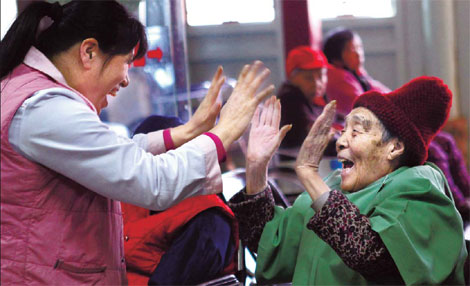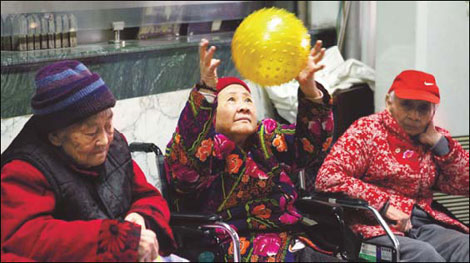Life
Families lament lack of palliative care centers
By Liu Yujie (China Daily)
Updated: 2011-03-29 07:59
 |
Large Medium Small |
|
Sun Junge, 92, plays with a nurse at Songtang Hospice in east Beijing. The hospice is 24 years old and has already had to move seven times. [Photo/China Daily] |
Shortage of hospices, funding and trained staff to care for the terminally ill in Beijing.
On a recent sunny day, Ma Yonghong sat through a two-hour bus ride to visit her ill mother at Songtang Hospice in east Beijing. With a bag of fruits in hand, she walked into a ward where her 95-year-old mother lay in bed watching television.
Stricken with Alzheimer's and paralyzed since July after falling from a stool, Ma's mother has been living in Songtang for more than six months, but it took Ma and her five brothers and sisters more than three months to find a place that could care for their mother at an affordable price.
"Hospitals in Beijing do not accept the terminally ill, while the majority of elderly care centers do not accept the mentally ill, those that do usually charge a lot and won't provide any medical assistance," said Ma, 52. "My mother has hardly anywhere to go except for staying at home. But we don't have time to keep her company and we don't know what to do when she is in pain and uncomfortable."
Ma's troubles in finding a facility that would care for her mother are apparently common among many families in Beijing who are trying to care for terminally ill relatives. According to a study last year by the Chinese Association for Life Care (CALC), Beijing has more than 15,300 people dying of cancer every year. The study said that nine out of 10 patients with late-stage cancer are not receiving help to relieve their suffering. The organization also found there are only two individual sites that specialize in palliative care in Beijing.Throughout China, there are just 30 hospices and 120 palliative care facilities in both private and public hospitals, according to the association.
The numbers are especially disturbing in light of 2009 statistics from the Ministry of Civil Affairs, which said the population of people over 60 has reached 149 million in China. More than 30 million are in need of nursing care. Among them, 9.4 million are unable to take care of themselves.
Guo Haoming, deputy director of Chaoyangmen Hospital who has been studying the issues surrounding palliative care for the past 10 years, said despite the municipal government's efforts to address care for the city's terminally ill patients, there are many practical hurdles in Beijing and across China. Key among them was the lack of funding and trained staff.
"Although the government encourages establishing retirement homes and offers investors and operators subsidies for every bed they provide, in reality there are no such incentives for hospice operators at the moment," said Guo, who urges the government to increase funding and support for hospice care services.
"Hospitals need to make money. Given the capital's demand for medical resources, it is understandable that hospitals turn away patients for whom they can do more. Beds at big hospitals are always in need," said Guo.
The dilemma leaves many terminally ill patients with the only option of living out their final days at home in pain, putting unnecessary stress on both themselves and their family members. Guo said the success of Songtang Hospice has been the exception rather than the rule.
Zhu Lin, deputy director of the hospice, echoed Guo's sentiments. Zhu said that the hospice has been relocated seven times since it was first established in west Beijing in 1987. Reasons for moving varied from financial issues to protests from superstitious locals.
"I just feel lucky that we have survived for these 24 years. Sadly I know many palliative care centers are running into debt," Zhu said.
What's worse is that Guo, through her yearlong study, found that the majority of caregivers at hospices in Beijing are not fully qualified. Most have no specialized training or certification since they are commonly recruited through housekeeping companies.
"Most of them are migrant workers from the countryside, and almost 40 percent of them are illiterate or have only attended elementary school. Lack of passion and love for the job as well as a relatively low salary given the heavy workload have made it tough for them to stay long in the hospice service sector," Guo said.
Liu Chunhua, a 32-year-old woman from Anhui province who currently works at Fenghuang Hospice in the suburbs of Beijing, said she earns no more than 1,500 yuan a month and has been too busy with work to see the sights in Beijing since she came to the nation's capital last February.
"I'm not earning enough money to support my family in my hometown. And this is not the metropolitan I expected to see and work in. I guess I will look into a job at a restaurant in the downtown area soon," Liu said.
Guo said other factors are also hindering China's hospice care industry, such as a lack of regulations to standardize hospice operations. She said there is a lack of medical equipment and standards for charging patients as well as a lopsided ratio between doctors and nurses.
Zhu, who has run Songtang Hospice and its 300 beds for more than seven years, said another key reason why China has inadequate palliative care facilities is a poor perception and understanding of death.
"In the last decade, I've witnessed a slow but sure change in attitude toward death, but death is still taboo in the Chinese culture. The public needs more positive guidance in their approach to the concept of death," Zhu said. "Death is as natural as birth. Everyone dies. Doing our best to take care of the dying now is creating better homes for ourselves in the future."
"It is high time for China to develop its hospice care services, which should not only offer medical advice and prescriptions for terminally ill patients, but also for needy or desperate patients seeking solace in their final days," said CALC secretary Ruo Yilan.
|
Dai Tang (middle), 84, throws an exercise ball at Songtang Hospice. |
| 分享按钮 |

